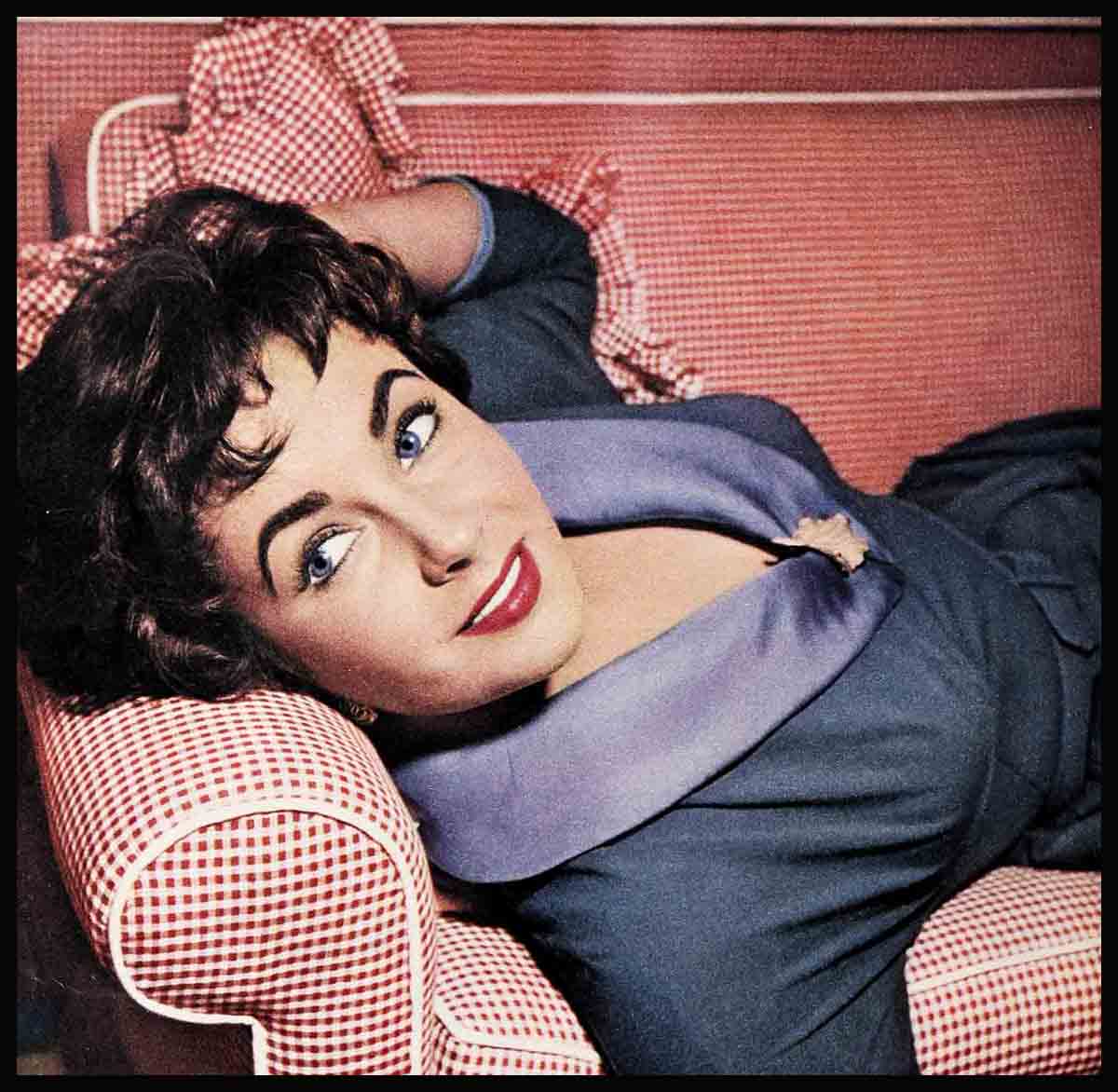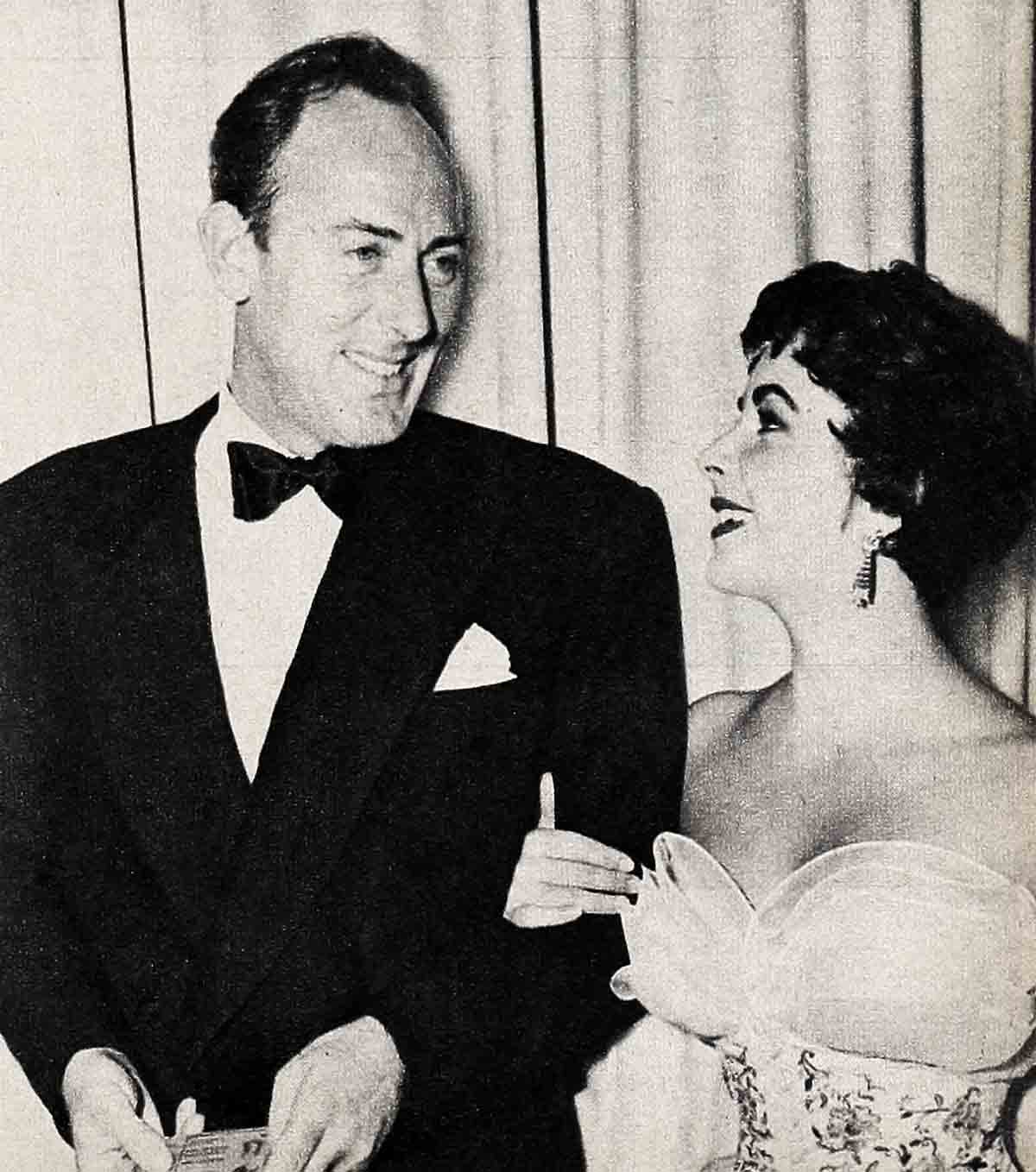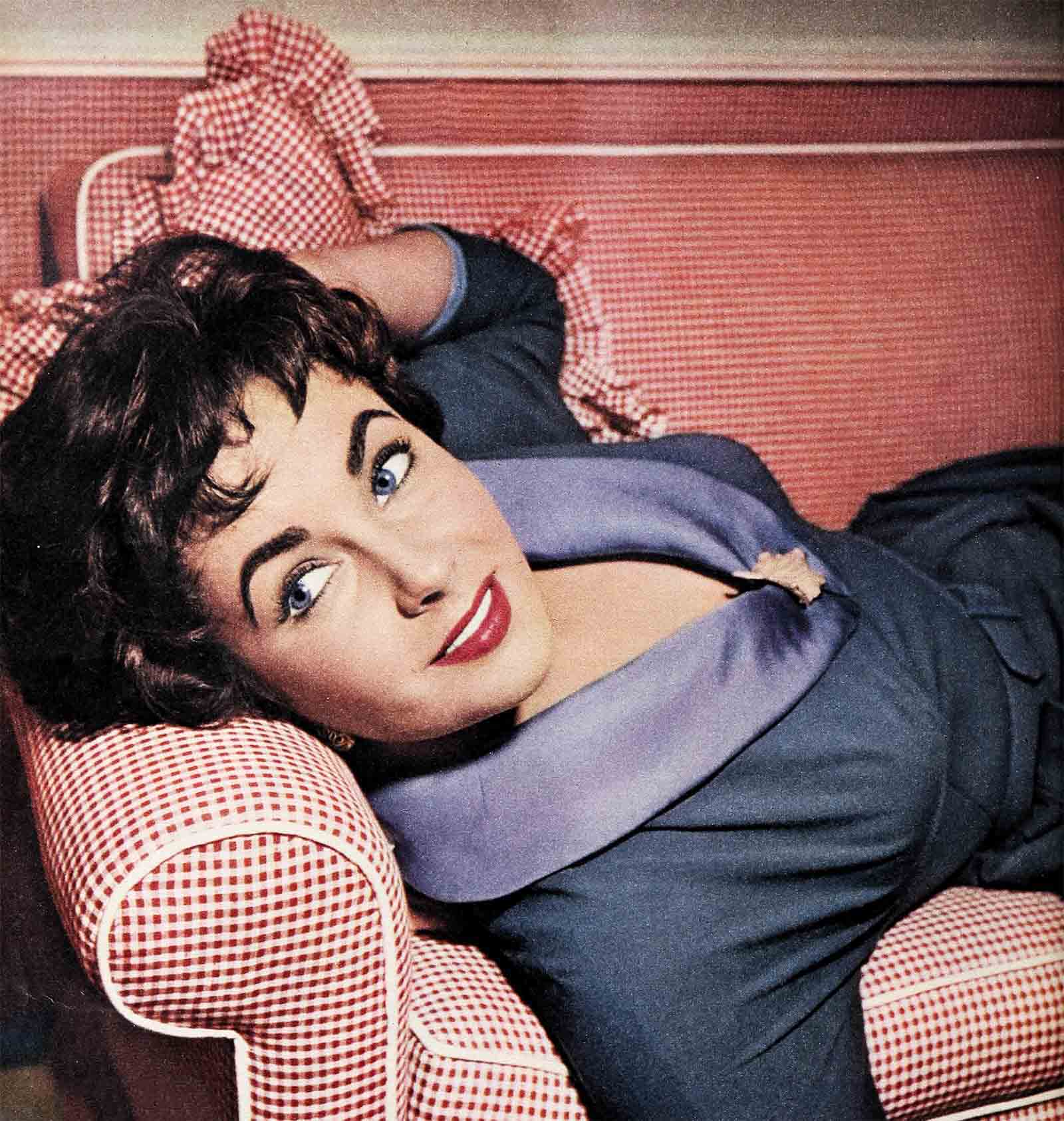
Home Is Where Her Heart Is—Elizabeth Taylor & Mike Wilding
Elizabeth Taylor was getting ready. She and her husband, Michael Wilding, were due at the house of their close friends, the Stewart Grangers, at seven-thirty. It was now after seven.
“Elizabeth darling,” Mike was saying for the fourth time, “can’t you hurry things a bit?”
He was pacing the floor as usual, making an occasional visit to the dressing-room to repeat his question and to take another anxious look at his young wife, still busily engaged in the process of trying to improve her already perfect face.
“I can’t understand!” he muttered half to himself on his fifth trip. “Morning or night, it’s always the same . . . Maybe I’m being a bore, but I’m quite sure it’s rude to be late to social functions. And it’s unprofessional to arrive after the others for work.”
Liz didn’t say a word. She had “turned herself off,” to use her own expression, and heard nothing. This kept her from getting rattled and she was able to finish dressing not quite, but almost on time.
“Thanks for being so patient, dear,” she said sweetly when finally she came into Mike’s sight, all ready to go. “How do I look?”
Once again—how many times now?—Michael melted. He would have hugged his enchanting wife if he hadn’t known better. She was wearing a new gown made of very crushable material.
The evening was a great success. As always, the Wildings were the focus of attention. Her beauty and naturalness, his charm and subtle wit cast a spell over the party. But since Liz had to be at work on her picture “Rhapsody” next morning, they left early.

As they arrived home Mike turned on the television set which is ingeniously built into a corner of their gigantic living room. There was a fight which he wanted to see. Liz went straight to the bedroom, where an immense TV screen faces the outsize bed, and tucked herself in.
“Darling,” she called out very soon, “please come in and see a wonderful show. An exciting mystery!”
“But I’d rather see this fight,” resisted Britisher Wilding—for a moment.
“And I can’t enjoy this at all without you right here beside me,” was lovely Liz’s reply.
“Is there any man alive who could resist such an appeal?” asks worldly, suave Michael Wilding as he admits that something similar happens almost every night. “All she has to do is flutter those long black lashes—at that time of night fully without make-up—and I’m ‘real gone’ as Liz and her pals would say.”
The next morning the alarm went off at 6:00 am. Liz didn’t stir. So what was there for Mike to do but get up, shut the thing off and start heckling his sleeping beauty again? This has gone on ever since Liz went back to work on “Elephant Walk,” soon after little Mikie’s birth.
But this time Mike had a little moral support. It came from none other than his stalwart eight-months-old son, Michael Howard, brought in by his nurse to visit with his parents. This is a daily ritual in the Wilding menage.
And as usual, big Mike had to get up, dress, “push” Liz a little more to tear herself away from Mikie, and then drive her to the studio. Mike wasn’t working, having finished “Torch Song.”
And so it goes, Liz is, according to Mike, not a conventional “good” wife. She doesn’t go into a tizzy because the plumber didn’t come (she hadn’t called him in the first place); she’s never cooked a meal or darned his socks; if she were not surrounded with well-trained help who watch the cleaning and laundry, there would no doubt come a day when neither Liz nor Mike would have a thing to wear.
Mike is very proud of Liz’s skill as a decorator, though. Didn’t it all work out fine, even though she insisted on “that beastly shade” (actually mauve, though Liz calls it periwinkle)? He’s not too fond of “all that foam rubber—guess I’m old fashioned,” but thinks all the furnishings are perfect for the architecture of the house which, after all, they chose together. He brought some of his things over from England, but he admits that they just didn’t fit into the general scheme. He’s given them to his chum, British actor Robert Newton. All except two exquisite purple vases he had bought from a friend in London “because he was so bloody broke.” He’s delighted with Liz’s rapture over these, which are perfect in the livingroom. That makes up for having had to discard everything else.

By his own admission, Mike is not the conventional “good” husband, either. In the first place, he is the laziest man in the world (this statement comes directly from Mr. Wilding, but Mrs. W. has never been heard to contradict it). He rarely lifts a hand around the house—for the good and simple reason that he doesn’t know how. Once he tried. He fixed a flood-lamp in the
garden, then he was afraid to snap it off in case it wouldn’t go on again. It burned all night. Their practical housekeeper took care of this impasse by calling an electrician. For months now, Michael has been “going” to make some cabinets for little Mike’s nursery from wonderful shelves he discovered in an unused room of the house.
“I’ll carpenter for relaxation,” he announced, “people do that, you know.” He talked about this project at length, but never did anything about it. “I’m black with embarrassment when it’s mentioned now,” he says. “I would have done it, if I had known how to set about it.”
Mike did try to do something about the landscaping around the fairly new house, but with little success. The lawn is a rather forlorn sight even today. But who cares? There are experts to do these things, reasons Liz. And the experts aren’t all the wonderful things Michael is. You can’t have everything.
Mr. Wilding is not a well-dressed man, either. He’s been known to appear for lunch in a tieless and nondescript shirt, unmatched sports jacket and slacks and a nautical cap.
“I won’t apologize for my appearance because I always look like this in the daytime,” he said, “but my association with the drama department of M-G-M (you know they’re trying to teach me English) will change all this. They’re so blooming slick, they’re putting me to shame.”
Meanwhile, if Liz teases him a little about his appearance, Mike need only remind her of all the times she has taken her shoes off, no matter how formal the occasion. Then they laugh and change the subject.
Actually she doesn’t care how he looks—it’s always mighty good to her—and this feeling is mutual. When someone asked him how he felt about Elizabeth’s hair turning straight after the birth of her baby, Michael commented, “I think she’s lovely no matter how you look at her.”
They’re that sympathetic and understanding of each other about everything, even the smallest issues. Mike can’t keep track of things and admittedly loses them “like confetti.” Once they spent a week on the beach, sharing quarters with a couple of his friends. First of all, the friends had to answer a sudden studio call, leaving them with the overhead. Then Mike lost two solid gold cigarette cases in the sand. It turned out to be a very expensive vacation indeed. No comment from Mrs. W. who knows how often her “bargains” could easily have been tagged extravagances.

Sometimes Liz has to wait for Mike because he’s lost his pipe or dark glasses right in the house too. But she never forgets those mornings and evenings when he’s been the victim of her tardiness.
There was a time, a few months ago, when Michael thought Liz was being overattentive, possibly a bit silly about their son. “After all,” he’d say, like many fathers have before him, “he’s just a baby.”
Today the picture has changed. In private, Liz often giggles silently as she spies on her husband watching the baby’s every move and listening intently to each sound.
She has heard again and again how he draws a picture of Mikie on a paper napkin when he talks about him over a luncheon table, and that he always “happens” to have photos of him handy. And a friend charmed her by repeating one of her husband’s remarks about his son: “He’s a very good little boy even when he wets his drawers.”
One of the things that fascinated Michael most was the baby’s first hassle with solid food. Evidently he had thought children drank milk and nothing else until they were two. “How he can eat that revolting stuff beats me,” he said when witnessing the first meal, but he never misses watching Mikie’s meals when he’s at home.
Up to quite recently, there was a bit of good-natured family squabbling about the temperature of the water in the swimming pool. Mike loves cold water, and now that the novelty of having a pool under his window has worn off, he often goes down to the beach mornings for a vigorous swim. Liz likes water that’s about 190 degrees, according to her adoring husband. “She likes hot water in a cold pool,” he says ambiguously and has suggested she take a long a cake of soap and save time.
But now, at Liz’s suggestion, Mikie is taking swimming lessons from his dad. And of course the water must be nice and warm for so small a boy—and his mother is enjoying it too.
Both the Wildings like doing things on the spur of the moment. They also enjoy “just sitting” and do a lot of that when they can. But they gave that up gladly when they rushed off on that trip to England so Michael could show Mikie to his family.
Both also are a source of constant astonishment to each other. Mike marvels at how Elizabeth can turn on a radio program in the middle, not even knowing what it is, and then listen with deep concentration while she dresses, bathes or does a few chores. Her favorites are mysteries like “Dragnet” and “The Whistler,” but anything that has an element of suspense intrigues her. It doesn’t matter whether she knows the beginning or the end.
Liz, who admires Mike’s talent for painting, would like him to turn out a masterpiece or two. He did what he calls a “disgraceful” portrait of his beautiful young wife from a photograph—“no self-respecting painter would do that”—when they were first married but after she left for America, and this now hangs in the nursery. The artist wonders what Mikie will do when he’s able to recognize it. There’s also a huge self-portrait somewhere in England that he wasn’t able to hold down to life-size. It could, he imagines, reveal a great deal that would embarrass the artist to any psychiatrist who might lay eyes on it.
When Mike didn’t produce the masterpieces she yearned for, Liz bought him a fancy camera. With this, she was sure he’d faithfully reproduce everything important that happens around the house.
“I was deeply moved,” says Mike, “but I explained that I couldn’t understand anything so complicated. If she’d bought a simple one that requires nothing more than counting feet between the camera and the subject, I might have added something to the family album. But Liz insisted on the latest in equipment, bless her, and there it is, still beautifully wrapped, occupying the secret compartment in my car. I’m scared of it . . .” admits the husky, unmechanical actor.
The Wildings have little time for play, apart from loafing and swimming, but occasionally they do ride. Liz puts Mike to shame, he says, since she’s been as one with a horse from her childhood, as everyone will remember who saw her in “National Velvet.”
“I keep thinking of Mikie when I see her prowess and ease,” says Mike. “I’d have died if I’d been her parents when she was riding and jumping six-foot jumps bareback at ten. I don’t know what I’ll do if he has the same inclination.”
Mike shares Liz’s love for animals. They spoil their four dogs and four cats, some of which were rescued by Liz in studio back lots, parking lots and pounds as far away as London. Mike’s favorite is Honey, a huge golden retriever, which he brought home to be a watch dog when they bought their isolated home. Honey is a source of unending amusement, as she practically eats up with affection, not for protection, anyone coming to the door. On the other hand, the “rat,” a miniature long-haired dachshund about a foot long that Liz brought back from England, keeps everyone alerted, even if the object of his attention is nothing but a snail.
Obviously each of the charming Wildings has a few peculiarities, as might be expected, but each seems to overlook the other’s. Michael, for instance, will not go “backstage,” as he calls the sets, nor does he like to frequent the noisy commissary, so he picks up his lovely wife at the M-G-M gate, then takes her to a remote place for lunch. There they can talk at ease, without interruptions.
Like most other couples, the Wildings are on a budget. They also have a business manager who makes them stick to it: so much towards paying off the house and pool, so much for domestic help, gardener, food, cleaning bills and—worst of all—only so much for clothes. The man didn’t know how casual Mike is about clothes, so he allowed a joint amount that would ostensibly include a certain sum for him. Liz takes care of that; she uses up most of Mike’s allowance, too. This is fine with her husband, who likes nothing better than to see her all dressed up and who takes a real interest in her wardrobe.
Obviously, running Michael Wilding is no chore at all—not for Elizabeth Taylor. She thinks the smartest thing she ever did was pick out a man that’s “perfect, just perfect the way he is—at least for me.”
THE END
It is a quote. PHOTOPLAY MAGAZINE NOVEMBER 1953




